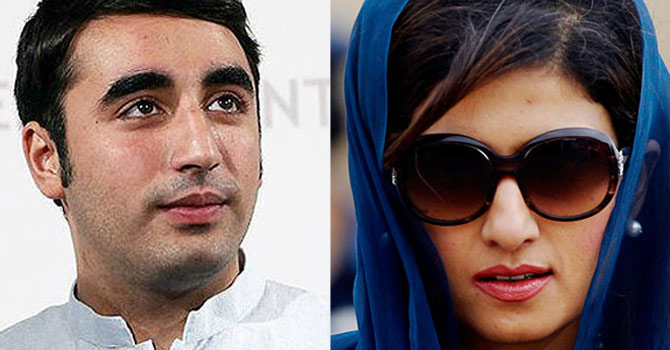Of late, Pakistan’s foreign minister, Hina Rabbani Khar, has become the unfortunate target of tabloid headlines here in the sub-continent (and beyond, I expect, as the story continues to go viral). According to an “expose” in the Weekly Blitz (a Bangladeshi tabloid), Pakistan’s top diplomat is allegedly embroiled in a passionate affair with Bilawal Zardari Bhutto, the 24-year-old scion of the Bhutto dynasty. His father is Pakistan’s current President, Asif Ali Zardari, and his mother is slain, two-time former prime minister of Pakistan, Benazir Bhutto. The story also indicates that not only are the couple “in love” but she is supposedly leaving her husband (industrialist Firoze Gulzar) and two young children to be for him.
The Blitz expose has garnered considerable media speculation despite the questionable nature of the source. The article quotes a “western intelligence agency” as the primary source for the piece. Overall, the reaction in Pakistani media has been largely muted, although it hasn’t prevented news dailies from circulating the story, which is probably fueling conspiracy theories as we speak. The Daily Telegraph has quoted a senior Pakistan People’s Party (PPP) official who considers the story part of a plot by the country’s intelligence agency to damage Ms. Khar’s reputation for having facilitated the visit of United Nations’ Working Group on Enforced and Involuntary Disappearances, which was investigating into the thousands of missing people detained by security forces. The agency has since denied this allegation.
Two significant op-eds (The News and The Daily Star) however attempt to shed light on how malicious slander affects public figures. The first, “Gender and the Politics of Slander,” suggests that, as a woman, Ms. Khar is more likely to be hurt by the rumours because of the way “politics and public service has been constructed and affirmed as a male prerogative” in Pakistan. The article gives an example of how the former foreign minister, a “handsome” Shah Mahmood Qureshi, left the office largely unscathed from scandal inferring that culturally prescribed roles for women subsume their public positions. The second article (from a reputed Bangladeshi newspaper), simply considers the act of tarnishing reputations of public figures as “something as old as time” giving examples of individuals in Communist China to Joseph McCarthy and even national figures within Bangladesh’s own history.
Unfortunately, on the heels of these headlines is an editorial by Shamshad Ahmad, a former foreign secretary who basically lambasts Pakistani female politicians for not looking like they belong in public office. He in particular makes an example of Ms. Khar and references to her 2011 inaugural trip to India where her Birkin bag, Cavalli sunglasses, and Jimmy Choos eclipse a key diplomatic event between the two nations. Interestingly, the visit was generally well received by the Indian public despite cynical murmurings to the contrary.
I generally agree with the Foreign Secretary on the need for professional attire in the work place. In a country where approximately 60 percent of the population lives on 2 dollars a day, overdoing on designer-ware may however serve to alienate Ms. Khar (a political figure) from the average Pakistani. Having said that, never has a woman’s attire ever deterred her from actually doing her job. In this regard, I am in complete agreement with the late, great Ginger Rogers who basically did everything Fred Astaire did but in high heels and backwards. Professional attire aside, if a veil does not prevent a woman from fulfilling her duties at work and at home, how do four inch Jimmy Choo’s prevent Ms. Khar (who also happens to adorn a lose veil, traditional to the subcontinent) from accomplishing the roles and responsibilities of a minister handling the country’s agenda on foreign affairs? Additionally, as a Pakistani citizen, I have come to accept the excesses of public figures. The internet is full of mumblings about public figures, their bloated budgets and nepotistic agendas, so Ms. Khar is hardly an exception.
The rumours are therefore preposterous, and it is sad that a woman of her standing and public clout is still relegated to being the target of “office gossip”. I cannot imagine how it must feel for her children to read/learn about her mother and her supposed exploits in the tabloids. When Ms. Khar was first nominated to this position, much of the complaints against her were in regards to her inexperience. This is common and such criticism is usually tolerated within political circles. Take President Obama, his purported inexperience was a key topic of discussion after his presidential nomination.
In my opinion, the attack on Ms. Khar is most likely politically motivated. In some ways it reminds of the malice surrounding Grameen Bank founder Muhammad Yunus and Bangladeshi Prime Minister Sheikh Hasina and her attempts to discredit a man who won the Nobel Peace Prize for his work in microfinance (poverty alleviation through micro-loans for women in developing countries). The Prime Minister’s dislike for Yunus may stem from his considerable fame in addition to his abortive effort to enter politics in 2007. In both cases, the powers that be attempt to malign the reputations of public figures with considerable political clout. Perhaps those responsible hope to remove Ms. Khar from office, seeking a less “complacent” candidate and to indirectly destabilize the current regime. Needless, the attack is “dirty politics” and such incidences are an unfortunate consequence of the political intrigues in Islamabad.


